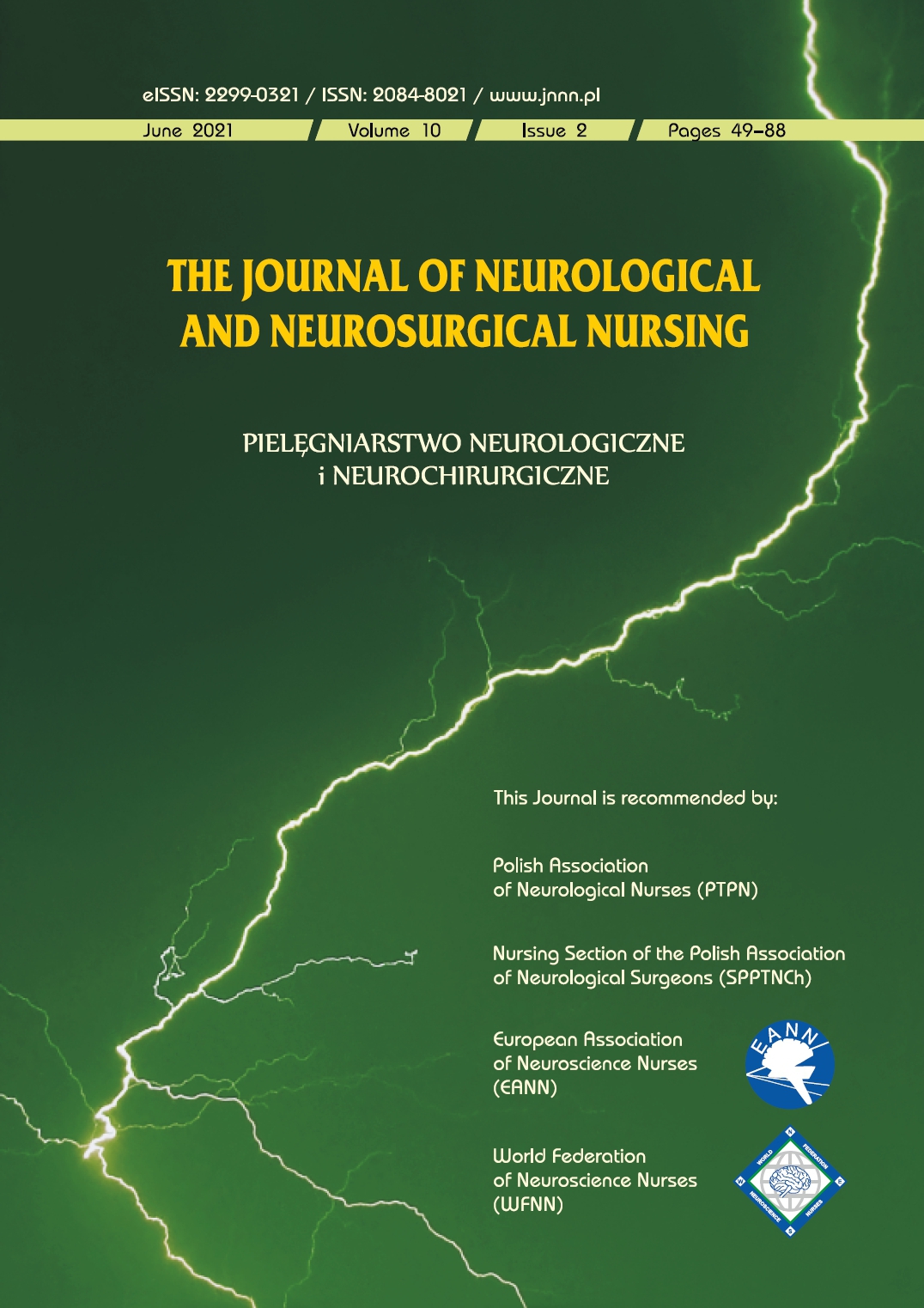Cognitive Disorders in People over 65 in Home Environment
DOI:
https://doi.org/10.15225/PNN.2021.10.2.3Keywords
cognitive disorders, elderly, home environmentAbstract
Introduction. Cognitive disorders are a serious problem in the elderly that lead to the loss of functional ability and thus dependence on others.
Aim. The aim of the article is to asses the cognitive disorders in people over 65 in home environment and show a correlation between age, sex, education, multiple morbidities, functional disability, and cognitive disorders.
Material and Methods. The research was carried out using diagnostic survey and direct observation. Also, the following research tools were used: Abbreviated Mental Test Score (AMTS), Barthel Scale, Lawton Scale and own survey questionnaire. The research was carried out on 329 women and 175 men, aged 66–94.
Results. 74.80% of the surveyed were found to have normal cognitive ability. Mild cognitive disability was found in 20.24% of the respondents, and severe — in 4.96%. It has been concluded that women with low level of education, more morbidities, and sight and hearing impairment had worse cognitive ability (p < 0.001). Moreover, it has been concluded that cognitive ability of the surveyed was worsening with age in a significant way (p < 0.001).
Conclusions. Cognitive disorders affected 25.20% of people over 65 in home environment. Furthermore, relevant factors that influenced the incidence of cognitive disorders in the elderly over 65 years old in home environment were: female sex, elderly age, low level of education and multiple morbidities. Moreover, cognitive disorders occurring in people over 65 in the home environment significantly contributed to the deterioration of their functional efficiency. (JNNN 2021;10(2):65–70)
References
Straś-Romanowska M. Późna dorosłość. W: Trempała J. (Red.), Psychologia rozwoju człowieka. Podręcznik akademicki. PWN, Warszawa 2011;326–350.
Kotapka-Minc S. Znaczenie badania neuropsychologicznego w diagnostyce otępienia. Pol Prz Neurol. 2007;3(2):61–68.
Bilikiewicz A., Matkowska-Białko D. Zaburzenia funkcji poznawczych a depresja. Udar Mózgu. 2004;6(1):27–37.
Gabryelewicz T. Łagodne zaburzenia poznawcze. Post Nauk Med. 2011;24(8):688–691.
Klich-Rączka A., Siuda J., Piotrowicz K. i wsp. Zaburzenia funkcji poznawczych u osób w starszym wieku. W: Mossakowska M., Więcek A., Błędowski P. (Red.), Aspekty medyczne, psychologiczne, socjologiczne i ekonomiczne starzenia się ludzi w Polsce. Termedia Wydawnictwo Medyczne, Poznań 2012;109–121.
Krzemieniecki K. Całościowa ocena geriatryczna i jej znaczenie kliniczne w onkologii — systematyczny przegląd piśmiennictwa. Gerontol Pol. 2009;17(1):1–6.
Contador I., Bermejo-Pareja F., Mitchell A.J. et al. Cause of death in mild cognitive impairment: a prospective study (NEDICES). Eur J Neurol. 2014;21(2):253–2e9.
Morrison R.S., Siu A.L. Survival in end-stage dementia following acute illness. JAMA. 2000;284(1):47–52.
Kostka T. Zaburzenia psychogeriatryczne (otępienie, depresja, delirium). W: Kostka T., Koziarska-Rościszewska M., Choroby wieku podeszłego. Wydawnictwo Lekarskie PZWL, Warszawa 2009;147–153.
Cytowicz-Karpiłowska W., Kazimierska B., Cytowicz A. Postępowanie usprawniające w geriatrii. Podstawy, wskazania, przeciwwskazania. Wyd. Almamer Wyższa Szkoła Ekonomiczna w Warszawie, Warszawa 2009.
Kostka T. Całościowa ocena geriatryczna. W: Kostka T., Koziarska-Rościszewska M., Choroby wieku podeszłego. Wydawnictwo Lekarskie PZWL, Warszawa 2009;17–37.
Borowicz A.M. Testy służące do oceny sprawności funkcjonalnej osób starszych. W: Wieczorowska-Tobis K., Kostka T., Borowicz A.M. (Red.), Fizjoterapia w geriatrii. Wydawnictwo Lekarskie PZWL, Warszawa 2011;45–60.
Kocemba J., Grodzki T. Zarys gerontologii klinicznej. Wyd. MCKP UJ, Kraków 2004.
Wiktor K., Drozdzowska B., Czekajło A., Hebel R. Wybrane metody oceny czynnościowej (funkcjonalnej) w praktyce lekarskiej. Ann Acad Med Siles. 2010;64(5–6):76–81.
Rosenthal T. Przewlekłe zaburzenia pamięci. W: Rosenthal T., Naughton B., Williams M. (Red.), Geriatria. Wyd. Czelej, Lublin 2009;291–313.
Wojszel B., Bień B. Rozpowszechnienie wielkich zespołów geriatrycznych w populacji osób w późnej starości — wyzwanie dla podstawowej opieki zdrowotnej. Prz Lek. 2002;59(4–5):216–221.
Pniewska J., Jaracz K., Górna K. Wpływ procesu starzenia się na funkcje poznawcze w populacji wiejskiej Wielkopolski. Pielęgniarstwo Polskie. 2011;1(39):7–10.
Melis R., Marengoni A., Angleman S., Fratiglioni L. Incidence and predictors of multimorbidity in the elderly: a population-based longitudinal study. PLoS One. 2014;9(7):e103120.
Cebulak M., Markiewicz I., Guty E. Ocena funkcji poznawczych u chorych objętych domową długoterminową opieką pielęgniarską. Probl Pielęg. 2014;22(1):20–26.
Białachowska A. Niesprawność funkcjonalna w umiarkowanym otępieniu w przebiegu choroby Alzheimera. Geriatria. 2010;4:5–9.
Bigelow W., Becker M., Collins T. Functional and cognitive change among elderly long term nursing facility residens. Abstract Book Association Services Research Meeting 1999.
Downloads
Published
How to Cite
Issue
Section
License

This work is licensed under a Creative Commons Attribution-NoDerivatives 4.0 International License.
Stats
Number of views and downloads: 342
Number of citations: 0
